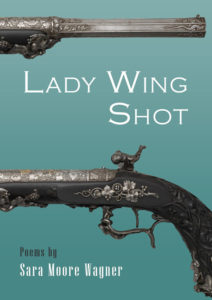 Review by Sharon Tracey
Review by Sharon Tracey
Lady Wing Shot, the third prize-winning poetry collection by Sara Moore Wagner, takes us deep inside the life and times of sharpshooter Annie Oakley, a woman whose fame and legend has outlived and somewhat eclipsed her. From the first poem, “Annie Oakley as a First God” (13), Wagner writes her into life in vivid poems that weave historical facts, myth-making, and personal history. The poet is a terrific storyteller as she writes about the poise and power of a sharpshooting girl from an earlier era who can still speak to our time and America’s worship of guns.
No ideas but in things William Carlos Williams famously wrote, and readers will find plenty here—wolves, Greek heroines, hunters, buffalo, bullets, beloved oaks, rolling hills. But Wagner aims higher and takes one thing—the gun—and places it firmly in her heroine’s hand to reveal not only the woman but all the things a gun can touch. For a change, it’s the woman with the long gun standing in the limelight. Through the eagle eyes of Annie, the poet keeps us focused on the bulls-eye but also on what else women shoot for. For the story of the Wild West and America is also the story of mothers and children, dislocation, violence, and the role and rights of women.
Wagner’s engaging persona poems, forceful and full of metaphor, effectively give voice and agency to Annie, while the poet draws from her own experience as a wife, mother, and daughter to create a tapestry of narrative poems that reflect on what the gun has done and undone in America. Poem epigraphs also do good work—mostly drawn from Annie’s own writings—and allowing her “to speak” in her own voice in the midst of the poet’s persona, historical, and myth-making poems. Poem titles ground the reader as well, signifying specific events and historical figures as well as the poet’s lived experience growing up in a culture with guns. Both Oakley and Wagner are daughters of Ohio and the love of the landscape suffuses the work through forests, hills, and creeks.
The Wild West Show brought Annie Oakley, Sitting Bull, and Buffalo Bill together for a time and Wagner creates snapshots of their lives both together and apart. Near the heart of the collection, we find Wagner’s epic twelve-part poem, “First Myth of the Wild West.” Annie is twenty-four the first time Sitting Bull sees her perform as the poet writes: (53)
…
What to give a girl who extinguishes
without cracking any wax,
whose bullets come out clean, who
nudges things from her husband’s lips
without breaking his teeth.
And later on: (60)
It was in her personality,
inside her little body was the Mississippi,
was the whole Ohio River, was the West
with its looping horses around a herd of buffalo.
She knew not to look at the gun, but at the thing,
to point at what you wanted until it fell
at your feet. To drown out the cries…
Later will come the European tour in which Annie embarks on the “ark” loaded with 180 horses and 18 buffalo, set to perform at Queen Victoria’s Golden Jubilee and then beyond. On route, Ohio is not far from her mind as Annie (67):
…—thought of the flat
hills of Ohio, that landlocked bit of heaven where every
bend in every road has an oak tree to mark
and hold. Mark me, she said, give me a mark.
In “Astride Mt. Vesuvius” (70) we find Annie near the top of the cauldron, this girl who “knew / how to win, ride the wind. Astride the world—/country girl—daughter of the original fire.”
as the poet muses:
…Who will paint her like this,
hang her above a mantle, shove her into the line
of history wild and fierce as she was at just this moment,
head full of illusion, American Hercules. Best.
In one of the last poems, “My Mother’s Eye,” the poet returns to her mother at fourteen and a familiar story of gun violence in America, and writes (100):
…
My mother is a doorframe. My mother is any landscape
you imagine her running through to the sheriff’s office,
baby sister in her arms. My mother is running and watching
the sky. How like and unlike my mother the sky, the womb
of chaos my mother burst from, as she burst
from that house so blue and fine, the gunshots
burrowing in the wall behind. I am alive
because of my mother’s blue eye,
and Annie Oakley (15) “of the / trees, diminutive and favored, little / sharp branch poking holes in the sky” is alive again due to Sara Moore Wagner’s revelatory poems.
Lady Wing Shot by Sara Moore Wagner
Lynx House Press, 2024, $18.95 [paperback]
ISBN: 978-0-89924-194-4
Sharon Tracey is a poet and editor and the author of three books of poetry: Land Marks (Shanti Arts 2022), Chroma: Five Centuries of Women Artists (Shanti Arts 2020), and What I Remember Most is Everything (All Caps Publishing). Her work has appeared in Radar Poetry, Terrain.org, Lily Poetry Review, The Ekphrastic Review, and elsewhere. She previously served as a director of research communications and environmental initiatives at the University of Massachusetts Amherst.
